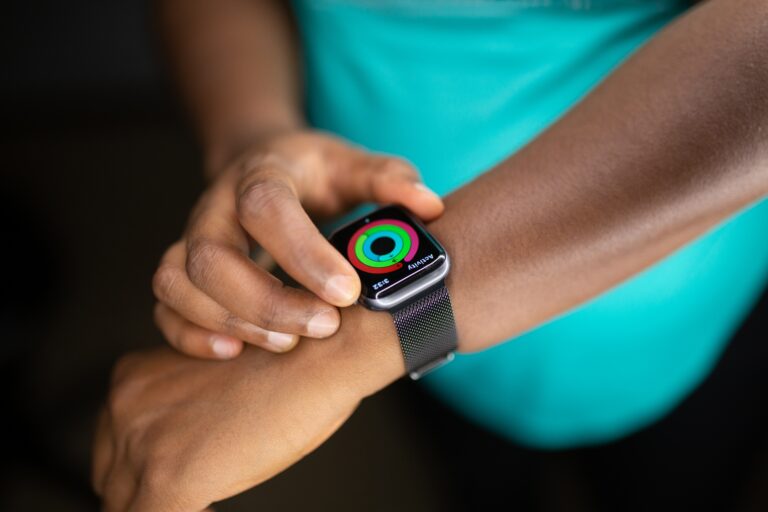Investment in global healthtech is booming, with over $50 billion pumped into startups in 2021 alone. The demand for technologies like telemedicine, at-home testing, smart watches, and other personal healthtech during the COVID-19 pandemic has been a major driver of funding and awareness, bringing new and innovative products to the market.
Some of the most exciting innovations in healthtech include real-time monitors like the FreeStyle Libre 2, which enables those with diabetes to have minute-by-minute data on their blood glucose levels via their phone, accessible VR surgical education tools like @HomeVR, and smart ‘e-skin’ apparel like Xenoma.
Whether it’s motivating healthy behaviors, boosting productivity, or supporting serious conditions, healthtech marketing should always prioritize keeping the public informed and supported. For technology like the FreeStyle Libre 2 and other cutting-edge medical devices, marketing campaigns have to be sensitive to people’s fears and uncertainties. On top of all this, as healthtech brands continue to grow, the need to differentiate and convey unique brand messages grows too.
To help get the right message out to the right people in a way that cuts through industry noise, healthtech providers have to build trust in their tech, using empathy to meaningfully connect their product to its users.
Take a look at three of our favorite healthtech campaigns that have broken boundaries, sparked new conversations, and demonstrated empathy.
Elvie - Breaking Women’s Health Barriers
Elvie, a London-based healthtech startup, created an innovative device that makes Kegel exercises and pelvic floor training easy. The Elvie trainer connects to an intuitive mobile app that allows users to track their progress in improving their pelvic floor strength.
A recent campaign saw the brand breaking the stigma around female urinary incontinence, an issue that affects 84% of women in the UK and over 60% of women in the US, by installing a billboard that “pees” on passersby. The 20-foot billboard is rigged so that water falls down onto pedestrians below, with the tagline “Leaks happen … but they don’t have to”.
As well as being timely (the campaign itself is an homage to a recently-banned viral TikTok), the imagery is striking, and Elvie’s decision to use outdoor advertising rather than digital-only adds to the statement. The campaign's effort to break the stigma around female urinary incontinence, and call out social media platforms for censoring similar content, establishes Elvie as an open and accepting brand, unafraid to open up taboo conversations that empower women to prioritize their health.
Fitbit - Personalized Patterns
A leader in wearable healthtech, Fitbit produces devices that monitor physical fitness, sleep, heart rate, and more, helping the wearer stay motivated. Fitbit decided to center this 2021 campaign around “shifting the patterns” of daily life to healthier ones as the world emerged from lockdown.
With an overall message of “self-care” and listening to one’s own body, the campaign consisted of various ads that focused on different individuals’ positive self-care patterns. By focusing on an overall health-related message, and representing a variety of different people’s daily stories, Fitbit establishes better emotional connections with their different target audiences.
Layla - AI for Teen Public Health
“Layla” was created by The Public Good Projects (PGP) to address unintended pregnancy among Black and Hispanic teenagers in Syracuse, New York. Teenagers can type in any questions about sex and pregnancy and get an immediate reply from Layla via a website chatbot, which uses AI and natural language processing.
Built in collaboration with local women to ensure that the chatbot ‘speaks’ realistically and that the target audience is represented across Layla’s branding, the “Layla’s Got You” campaign demonstrates the potential of combining digital technology with human-centered design. Using AI to establish trust and familiarity, Layla builds emotional connections and empowers young people to access the healthcare they need.
Building connections with customers
The common thread among these campaigns is their emphasis on connectivity and empathy. Successful campaigns, no matter the industry, need to appeal to their target audience’s wants, needs, and emotions. For healthtech brands, it’s vital to strike a balance between the technical (important medical information) and the emotional (the mental or physical pains each individual is feeling).
At FMXA, we know how delicate this balance is. By combining our experience in brand development and content creation with our in-depth tech industry knowledge, our campaigns emotionally connect, creatively stand out, and technically resonate, meeting both your technical and emotive requirements.
We’d love to help you devise a unique campaign to market your tech. See more of our campaign experience here and get in touch with the team for more information.
